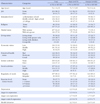Abstract
Purpose
The purpose of this study was to identify the total, direct, and indirect influence of depression on health behavior (HB); to determine relative magnitudes of specific mediating effects of anger expression in gender specific subgroup among elders.
Methods
A cross-sectional correlational survey was conducted in S and G cities with 333 community-dwe1ling elders (male=170, female=163). Data were collected from September 7 to November 7, 2013. Kee's GDSSF-K for depression, Spielberger's STAXI for anger expression and Choi & Kim's health behavior assessment tool were used. Multiple-mediation analyses using Indirect SPSS macros were performed.
Results
Depression had a significant total, direct and indirect effect on HB in both male and female. In women, direct and indirect effect of depression on HB were higher than in men. Specific indirect effects of depression on HB were evidenced via anger-control and anger-out for men and via anger-control and anger-in for women. Among anger expression, anger-control was a more salient mediator for both male and female.
Figures and Tables
 | Figure 1Conceptual model of the study and analytic diagram for the multiple-mediation model proposed. |
References
1. Seo JH, Rye HS. Relationships among depression, life satisfaction and health promotion behavior in the elderly. J Korean Acad Community Health Nurs. 2010; 21(2):169–177.

2. Kim JD, Kang YK. 2011 National health insurance statistical yearbook. National Health Insurance Services;2013. 11. Report No. 92006.
3. Statistics Korea. 2012 life table.[Internet]. 2013. 12. cited 2013 Dec 9. Available from: http://kostat.go.kr/portal/korea/kor_nw/2/1/index.board?bmode=read&bSeq=&aSeq=310490&pageNo=1&rowNum=10&navCount=10&currPg=&sTarget=title&sTxt=.
4. Kim YJ, Park JH, Lee JJ, Huh YS, Lee SB, Han SK, et al. Standardization of the Korean version of the geriatric depression scale: reliability, validity, and factor structure. Psychiatry Investig. 2008; 5(4):232–238. http://dx.doi.org/10.4306/pi.2008.5.4.232.

5. Saz P, Dewey ME. Depression, depressive symptoms and mortality in persons aged 65 over living in the community: a systematic review of the literature. Int J Geriatr Psychiatry. 2001; 16(6):622–630. http://dx.doi.org/10.1002/gps.396.

6. Zhang JP, Kahana B, Kahana E, Hu B, Pozuelo L. Joint modeling of longitudinal changes in depressive symptoms and mortality in a sample of community-dwelling elderly people. Psychosom Med. 2009; 71(7):704–714. http://dx.doi.org/10.1097/PSY.0b013e3181ac9bce.

7. Choi HJ, Yoo JH. The effect of depression and self-efficacy on health promotion behavior among the elderly living alone in rural area. J East West Nurs Res. 2011; 17(2):149–155.
8. Seo SG. Cognitive factors related to anger and their therapeutic implications [dissertation]. Seoul: Seoul National University;2004. p. 167.
9. Tel H. Anger and depression among the elderly people with hypertension. Neurol Psychiatry Brain Res. 2013; 19(3):109–113. http://dx.doi.org/10.1016/j.npbr.2013.05.003.

10. Staicu ML, Cutov M. Anger and health risk behaviors. J Med Life. 2010; 3(4):372–375.
11. Park MY, Kim JI, Kang HS. The relationship between health promoting behaviors and anger in elderly women. J Korean Acad Fundam Nurs. 2005; 12(3):354–361.
12. Kim CJ. Metabolic syndrome risk factors, anger, depression and self-care activities according to mode of anger expression in diabetic elders. J Korean Gerontol Soc. 2007; 27(3):549–561.
13. Park YR, Yoo MS, Son YJ. The relationship between trait anger, life style and physical symptoms in elderly people. J Korean Acad Fundam Nurs. 2007; 14(1):72–82.
14. Baeg S, Wang SK, Chee IS, Kim SY, Kim JL. Anger in elderly patients with depressive disorders. Psychiatry Investig. 2011; 8(3):186–193. http://dx.doi.org/10.4306/pi.2011.8.3.186.

15. Jang MH, Won JS. Asssociation of anger and anger expression, social support, self-esteem, and depression in elderly. J Korean Acad Psychiatr Ment Health Nurs. 2009; 18(3):259–268.
16. Chin EY, Ko SH. Suicidal ideation and anger between community-living and institutionalized elders. Soc Sci Stud. 2012; 36(2):251–270.

17. Wilson RS, Bienias JL, Mendes De Leon CF, Evans DA, Bennett DA. Negative affect and mortality in older persons. Am J Epidemiol. 2003; 158(9):827–835. http://dx.doi.org/10.1093/aje/kwg224.

18. Simon RW. Sex, anger and depression. Soc Forces. 2010; 88(4):1543–1568. http://dx.doi.org/10.1353/sof.2010.0031.

19. Seo SY. Life satisfaction, activities of daily living, depression and health behavior of low income elderly living at home. J Muscle Joint Health. 2010; 17(2):162–172.

20. Forgays DK, Spielberger CD, Ottaaway SA, Forgays SG. Factor structure of the state-trait anger expression inventory for middle-aged men and women. Assessment. 1998; 5(2):141–155. http://dx.doi.org/10.1177/107319119800500205.

21. Kim KB, Song SJ, Sok SR. A study on correlation among anger, health state, and quality of life in the elderly. J Korean Acad Psychiatr Ment Health. 2008; 17(1):19–27.
22. Luutonen S. Anger and depression: theoretical and clinical considerations. Nord J Psychiatry. 2007; 61:246–251. http://dx.doi.org/10.1080/08039480701414890.
23. Bentler PM, Chou CP. Practical issues in structural equation modeling. Sociol Methods Res. 1987; 16:78–117.
24. Choi YH, Kim SY. Development of health behavior assessment tool of the Korean elders. J Korean Acad Nurs. 2001; 27(3):601–613.

25. Yesavage JA, Sheilkh JI. 9/Geriatric Depression Scale (GDS): recent evidence and development of a shorter violence. Clin Gerontol. 1986; 5(1-2):165–173. http://dx.doi.org/10.1300/J018v05n01_09.
26. Kee BS. A preliminary study for the standardization of geriatric depression scale short form-Korea version. J Korean Neuropsychiatr Assoc. 1996; 35(2):298–307.
27. Chon KK, Hahn DW, Lee CH, Spielberger CD. Korean adaptation of the state-trait inventory: anger and blood pressure. Korean J Health Psychol. 1997; 2(1):60–78.
28. Preacher KJ, Hayes AF. Asymptotic and resampling strategies for assessing and comparing indirect effects in multiple mediator models. Behav Res Methods. 2008; 40(3):879–891. http://dx.doi.org/10.3758/BRM.40.3.879.

29. Park YJ, Baik S, Shin HJ, Yoon JW, Chun SH, Moon S. Anger, cardiovascular health and depression in middle-aged Korean men: the mediating effect of social support. J Korean Acad Nurs. 2006; 36(5):863–871.

30. Kwon HJ, Rho ES. A grounded theory approach to the phenomenon of elderly women's anger. J Korean Acad Psychiatr Ment Health. 2000; 9(2):220–230.




 PDF
PDF ePub
ePub Citation
Citation Print
Print






 XML Download
XML Download